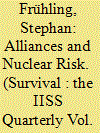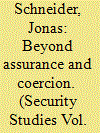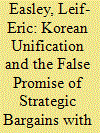| Srl | Item |
| 1 |
ID:
183260


|
|
|
|
|
| Summary/Abstract |
There is a fundamental tension between the Biden administration’s stated intent to strengthen US alliances while at the same time reducing the role of US nuclear weapons. The credibility of extended-deterrence commitments – which in times of great-power conflict lie at the heart of US alliances – hinges on US allies and adversaries believing that Washington would resort to nuclear weapons to defend the core interests of its allies. A no-first-use or sole-purpose declaration would undermine deterrence and alliances by qualifying US security guarantees. The Biden administration and US allies should focus on coupling allied security to the threat of US nuclear use, to risks of inadvertent escalation for adversaries, and to the value of limited nuclear use in addressing conventional military imbalances in the Indo-Pacific. Forward-basing US nuclear forces in the region, where they are currently absent, is key to achieving all three of these aims.
|
|
|
|
|
|
|
|
|
|
|
|
|
|
|
|
| 2 |
ID:
177068


|
|
|
|
|
| Summary/Abstract |
This article examines the proliferation-inhibiting effect of US alliances. Existing explanations for nuclear reversals of US allies have focused either on the assurance that alliances provide or on US threats of abandonment. However, neither model can account for the fact that allied leaders disagreed over the reversal decision. Also, whether an ally agreed to or rejected nuclear restraint depended on which policymakers carried the day as much as on external factors. To explain why some policymakers accept and others refuse nuclear reversal, I draw on a psychological aspect of US alliances: the social pressure inherent in demands by the United States as an ally holding a superior international status. New evidence from Germany and South Korea shows only policymakers who acknowledge this higher rank of the United States, and hence view their own nation as inferior, respond to this social pressure by obeying the US demand for a nuclear reversal.
|
|
|
|
|
|
|
|
|
|
|
|
|
|
|
|
| 3 |
ID:
170039


|
|
|
|
|
| Summary/Abstract |
If the US alliance system in the Asia-Pacific endures the current divergence of strategic aims and national identities, it will do so under enormous stress.
|
|
|
|
|
|
|
|
|
|
|
|
|
|
|
|
| 4 |
ID:
153009


|
|
|
|
|
| Summary/Abstract |
Traditionally seen as a President consumed by the war on terror, George W. Bush is frequently portrayed as being relatively uninterested in Asia, and unable to outline a vision or a strategy to China, America’s Asian allies and Asian multilateral mechanisms. This article will revisit Bush’s policy on Asia and show a president who guided the United States with a policy that balanced the need to combat global terrorism and locate a focus on Asia. He faced the dilemmas of building cooperative relations with a rising China while trying to foster American alliances and partnerships in Asia, and managing the wars in Afghanistan and Iraq. Utilizing qualitative content analysis as the main research method, the article will demonstrate that the Bush administration had not a lack of focus on Asia and that Bush’s diplomacy to Asia should be recognized as one of the most significant achievements of his presidency.
|
|
|
|
|
|
|
|
|
|
|
|
|
|
|
|
| 5 |
ID:
174443


|
|
|
| 6 |
ID:
145266


|
|
|
|
|
| Summary/Abstract |
Missile defence plays an increasing role in NATO and in most US alliances in Asia, which raises the question of what impact it has on the management of extended deterrence. Extended deterrence relies on the threat of escalation. Since the costs of escalation are different for different allies, the management of extended deterrence is inherently difficult. Missile defence shifts the relative costs of conflict, and therefore also impacts on the alliance bargains that underpin agreement on extended deterrence strategy. Although increased defensive capacity is a clear net benefit, the strategic effects of its deployment and use can still be complex if, for example, missile defence increases the chances of localizing a conflict. The article discusses the role of missile defences for the US homeland, and of the territory and population of US allies, for extended deterrence credibility and the reassurance of US allies in Asia and in NATO. It argues that there is increased scope in strengthening deterrence by enmeshing the defence of the US homeland with that of its allies, and that allies need to pay closer attention to the way the deployment and use of missile defence influence pressures for escalation. In general, missile defence thus reinforces the need for the United States and its allies in Europe and Asia to negotiate an overall alliance strategy.
|
|
|
|
|
|
|
|
|
|
|
|
|
|
|
|
| 7 |
ID:
162832


|
|
|
| 8 |
ID:
177885


|
|
|
|
|
| Summary/Abstract |
Despite rising threats and challenges in Northeast Asia, the US commitment to its allies there has become less certain. In part, this is by design. President Trump argued that less categorical signals would encourage US allies to do more, either in their own defense or to support (and finance) forward deployed US forces. Hearing this, Japanese and South Korean (ROK) leaders have been led to consider alternatives to the status quo. They increased defense budgets, a welcome development in Washington, but they also have taken measures that may complicate alliance dynamics, undermine crisis stability, and weaken the broader project of balancing Chinese power. Early in his term, President Biden pledged to improve alliance relations. But confronted with uncertainty, Japan and Korea continue to edge toward offensive systems, including missile forces, which may prove destabilizing in crises. They have also moved away from the roles- and missions-based specialization of military labor that has enhanced alliance efficiencies for decades.
|
|
|
|
|
|
|
|
|
|
|
|
|
|
|
|
| 9 |
ID:
152092


|
|
|
|
|
| Summary/Abstract |
When do anti-base movements manage to influence policy, and when do they fail to do so? Base scholars have largely overlooked what I argue is a significant factor that can shape public and government response to anti-base movements: political opportunities associate with framing efforts by key actors involved. Based on two cases of anti-base movements in South Korea, I show how framing battles between activists and media shape political opportunities afforded to anti-base movements and can ultimately influence movement success.
|
|
|
|
|
|
|
|
|
|
|
|
|
|
|
|